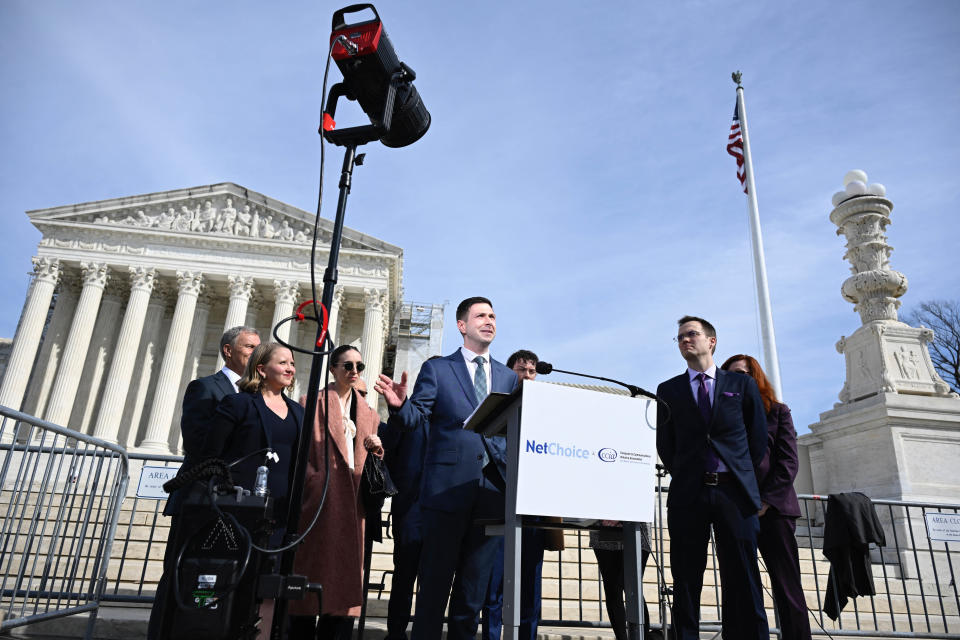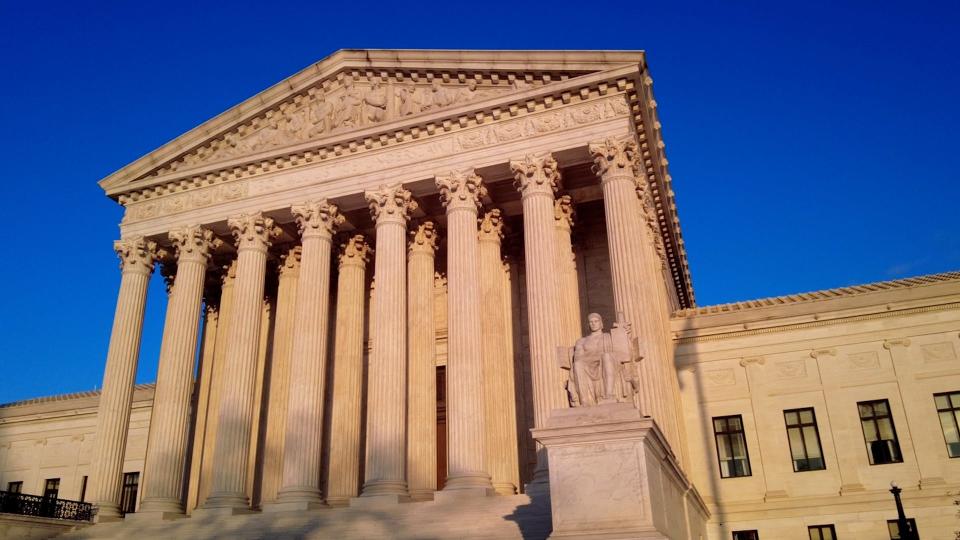Supreme Court sounds skeptical of Texas and Florida laws to regulate social media
- Oops!Something went wrong.Please try again later.
- Oops!Something went wrong.Please try again later.
WASHINGTON − The Supreme Court on Monday sounded skeptical of the broad sweep of laws passed by Texas and Florida to regulate powerful social media companies like Facebook, YouTube, TikTok and X, but struggled with how to assess the huge First Amendment implications of the controversial legislation.
The justices spent nearly four hours debating one of the most closely-watched − and politically tinged − cases of the year, one that could change the way millions of Americans interact with social media ahead of the presidential election.
Texas and Florida passed laws in 2021 limiting the ability of social media giants to regulate user content over concerns they were suppressing conservative viewpoints. Inspired in part by decision of Twitter and other major platforms to suspend former President Donald Trump after the Jan. 6 attack on the U.S. Capitol, the laws would severely limit the ability of social media companies to kick users off their platforms or remove individual posts for violating a platform's rules.
Related: Mask mandates? Supreme Court rejects appeal from Marjorie Taylor Greene, GOP lawmakers
Is TikTok a newspaper, a phone company, or something else?
Solicitor General Elizabeth Prelogar urged the court to take a narrow approach and rule that the states can’t tell Facebook, YouTube and X how to moderate their content while taking a pass, for now, on other questions about regulating social media.
“It's not necessary here to try to figure out how the First Amendment applies to new technology in general or to every possible website or the Internet in particular,” Prelogar told the court about the Texas law. “This law has a very clear defect.”
Trade groups representing the nation's social media companies, as well as the Justice Department, argue the Supreme Court should strike down the laws because they infringe on the companies' First Amendment right to free speech, consistent with the court's 1974 ruling that Florida couldn’t require a newspaper to publish replies to its editorials.
“This case involves editorial decisions at its heart,” said former U.S. Solicitor General Paul Clement, who represented the social media sites. If the platforms have to post any and all content, he said, the sites will become "gobbledy-gook."

More: Calling himself `presumptive nominee,' Trump tells Supreme Court to keep him on the ballot
But Florida and Texas say social media platforms are less like newspapers and more like telephone companies who are transmitting content generated by customers, not creating it themselves.
And because everyone today communicates online, if the big social media companies are allowed to stifle certain viewpoints, “there will be no public square to speak of,” Texas Solicitor General Aaron Nielson told the court.
Florida Solicitor General Henry Whitaker said Facebook and X are different from newspapers because they have no space constraints so it’s less burdensome to require them to display any content a user may post.
Justice Sotomayor: 'There's too much information'
But some of the justices pointed out that while there may be no physical space constraints, there are “constraints of attention.” Users rely on the websites to curate the experience for them.
“Even though it has infinite space, it really doesn’t because viewers, myself included, or users, can’t access the millions of things that are on the Internet and actually get through them and pick the things we want because there’s too much information,” said Justice Sonya Sotomayor. “We’re limited by human attention spans. So are they.”

Comparing YouTube with the telegraph
Justice Samuel Alito rejected the 20th century comparisons made by lawyers on both sides.
"So you say this is just like a newspaper, basically. It's like the Miami Herald," he told Clement. "And the states say no, this is like Western Union. It's like a telegraph company. I look at this and I say it's really not like either of those."
“I don’t know how we can decide this case by jumping to one side or the other,” he said.
The justices complained that they didn’t have enough information about which sites would be affected by the laws and what actions on those sites might be covered. Both state laws have been temporarily paused while the Supreme Court decides if they can survive a First Amendment challenge.
'Litigating in the dark'
If LinkedIn hosts a virtual job fair, would its rules about who can participate have to comply with Florida’s law, Justice Ketanji Brown Jackson asked.
Whitaker responded that he wasn’t “totally aware of all the facts” in such a scenario.
“I think that’s a problem in this case,” Jackson said. “We’re not all aware of the facts of what’s happening.”
When Alito asked for a list of all the sites covered by Florida’s law, the state’s solicitor general said he didn’t have one. He blamed the social media sites for being “fairly cagey about which of their members they thought the statue applied to.”
“We’re litigating in the dark here,” Whitaker said.

Puppy dog posts
The states and the social media companies also disagreed over what would happen if the laws were allowed to take effect.
Clement said some of the companies might allow only posts about puppy dogs, “at least in Florida, until we can get this straightened out.”
“We’d sort of have to fundamentally change our business models,” Clement said, “and I think each company is going to make their own judgment about how they’d come into compliance.”
More: 'So much winning'? Donald Trump remade the Supreme Court. It hasn't always made him a winner
Pointing to the part of Texas' law that says platforms can't discriminate against users based on geography, Clement said that would prevent social media companies from pulling out of that state altogether.
But Nielson said Facebook and other sites can pull out of Texas if they want to. If they don’t, they can be sued by the state for any content moderation viewed as discriminatory.
“If we can’t prove viewpoint discrimination, they will prevail,” Nielson said.
An al-Qaida exception?
Justice Brett Kavanaugh asked whether a site could block a post that praises the terrorist group al-Qaida.
“You can’t very well say you can have the anti-al-Qaida but not the pro-al-Qaida,” Nielson responded. “If you just want to say, `No one’s talking about al-Qaida here,' they can turn that off.”
Chief Justice John Roberts said the case turns on whether the judgment about who can and can’t post content is a decision left up to a government entity or to the social media platforms.
“The First Amendment,” Roberts said, “has a thumb on the scale when that question is asked.”
A decision is expected by late June.
This article originally appeared on USA TODAY: Supreme Court debates first amendment in major social media case

